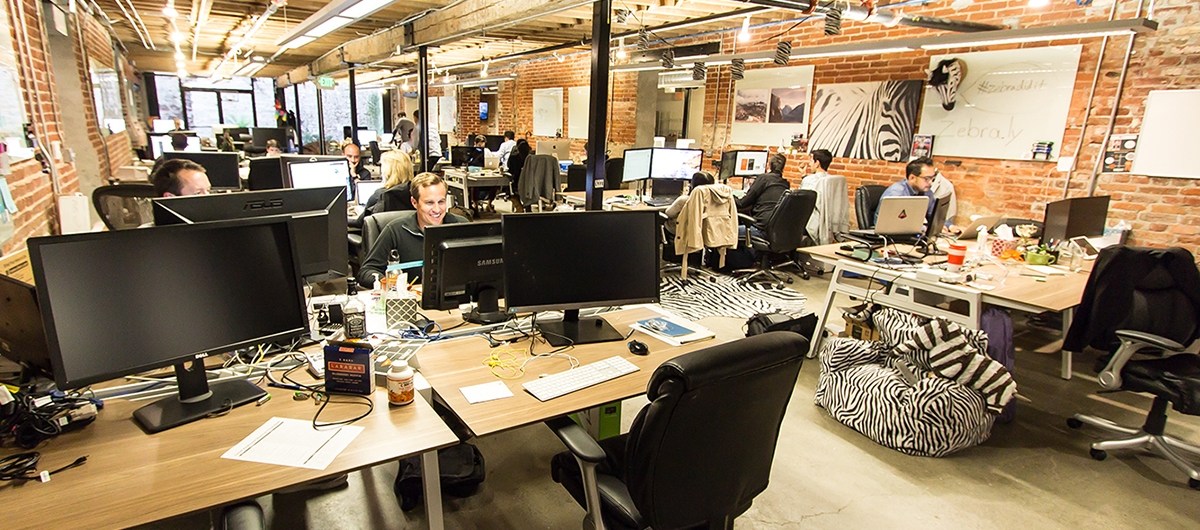This guest article is written by Stefan Bhagwandin of ShareYourOffice, San Francisco
To create a coworking space, start with your own problems
For the majority of our respondents, creating a coworking space made sense because it solved their own problems. Much like in the startup world, the easiest way to build a good product is to fix one of your own problems. If it's a good enough solution, you'll soon realize that other people were having the same problem.
For the owner of BrooklynWorks at 159, the problem was that there weren't enough affordable, quiet office spaces for independent workers in his part of Brooklyn. He solved his problem, and soon enough, fellow freelancers and remote workers in the neighborhood joined him.
But there's no better example of the "accidental" coworking space than Jeff from Platform Coworking.The operation started as a series of Craigslist ads, intended to find officemates to keep him company in his empty work space. Back in 2007, coworking was more or less unheard of, so the ads picked up local press. As demand grew, the organization grew with it, culminating in the formation of Platform Coworking in 2012.
Even if you don't have a personal work space problem to solve, it pays topay attention to the problems around you. Your immediate surroundings can give you a good hint as to what kind of work space the neighborhood needs. Are your coworkers always complaining about something specific? Are the cafes always filled with disgruntled freelancers?
Liz from Portland, ME's PelotonLabs opened her space in a town where people are often moving in and "bringing their jobs with them". She was aware of this trend, and she knew how to cater to the crowd that recently moved out of big cities like NYC and SF. The culture, design, and overall feeling of the space has to suit your target audience. The only way to do this is to know who you're targeting.
All of that aside, there are exceptions to the rule, and you can still start a coworking space out of personal desire. That's how the U.S. branch of the Centre for Social Innovation got its start. The owner liked what he saw over at the Toronto location, and he did what he could to bring it to NYC.
When you run a coworking space, you're part of something bigger than yourself
For many, the sense that coworking would soon become a global phenomenon is unmistakable. Stephanie of Connect Coworking is happy to be "part of a global movement", and Idea Space's Lauren boldly claims that "coworking is leading to a lasting change in the way the world works". In practice,riding the wave and being part of the trend is all it takes to found a successful space.No obligation to guess at why the movement is so powerful.
But there's no harm in guessing, either. For one manager of Denver's Thrive, coworking is special because it helps take the stress off of running a business. Taking business into your own hands is a "daunting process," Stephanie says, and being around people who're going through the same thing can help you keep your cool.
Some are dedicated to the coworking movement, through and through. Chirag from NoD Coworking wants to see coworking expand to "schools, governments, corporations, non-profits, and religious institutions". If you're an aspiring founder and you want to push the boundaries of coworking, use your insight to stay one step ahead of the competition.
Altogether, the sense that you're part of a larger movement and not just running a one-person show is a big part of what makes coworking feel special.
There are many paths to success, but all require a deep understanding of the customer
Many founders believe that community is the key to a coworking space's success. Katie and Megan from Durham, NC's Mercury Studio explain that it's best to build up a community beforehand, if you can. Preexisting connections make it easier to hit the ground running and fill your space right away.
For CoLab Factory, community and kinship comes in the form of incubator-like services, where startups receive help and learn from more experienced peers. The best way to beat the local Starbucks and the home office is to offer value to members beyond a desk and a chair.
But community isn't necessary for every coworking space. What matters is understanding your audience, and what your audience wants might not be community.
In The Vault's case, the founding members were working on a tech startup as well, so they "operated like the startups [they] serviced". Likewise, Onward Coworking founder Patrick says that "you need to understand what type of people you are catering to, then design the space based on people's needs". This might be as simple as knowing which commute routes are popular and what type of coffee people prefer to drink.
Long story short? Getting into the customer's head is the best way to guarantee success as a coworking space.
Like starting any other business, getting a coworking space off the ground will feel like an uphill battle. It's a hard process for everyone, and there are as many approaches as there are people.
These expert tips will send you in the right direction, but if you want to run your own coworking space, you'll have to discover for yourself what your audience truly wants in a work environment.








